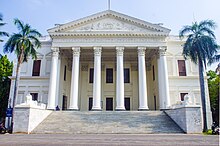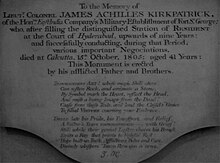White Mughals
 | |
| Author | William Dalrymple |
|---|---|
| Language | English |
| Subject | Narrative history |
| Publisher | Penguin Books |
Publication date | 29 March 2002 |
| Publication place | United Kingdom |
| Media type | Print (Hardcover, Paperback) |
| Pages | 512 pp (Paperback edition) |
| ISBN | 0-14-200412-X |
| OCLC | 55121980 |
| Preceded by | The Age of Kali |
| Followed by | Begums Thugs And White Mughals |
White Mughals is a 2002 history book by William Dalrymple. It is Dalrymple's fifth major book, and tells the true story of a love affair that took place in early nineteenth century Hyderabad between James Achilles Kirkpatrick and Khair-un-Nissa Begum.
Summary
[edit]The book is a work of social history about the warm relations that existed between the British and some Indians in the 18th and early 19th century, when one in three British men in India was married to an Indian woman. It documents the inter-ethnic liaisons between British officers, such as Charles "Hindoo" Stuart, and Indian women, and the geopolitical context of late 18th century India. Like From the Holy Mountain, it also examines the interactions of Christianity and Islam, emphasizing the surprisingly porous relationship between the two in pre-modern times.
At the heart of White Mughals is the story of affair which saw a British dignitary, the East India Company Resident in Hyderabad,[1] Captain James Achilles Kirkpatrick, convert to Islam and marry Khair-un-Nissa, a Hyderabadi noblewoman of royal Mughal descent. As the British Resident in Hyderabad, Kirkpatrick is shown to balance the requirements of his employers, the East India Company, with his sympathetic attitude to the Nizam of Hyderabad.
The very title of White Mughals indicates its subject: the late 18th- and early 19th-century period in India, where there had been ‘a succession of unexpected and unplanned minglings of peoples and cultures and ideas’. On one level, the book tells the tragic love story of James Kirkpatrick, ‘the thoroughly orientalised’ British Resident in Hyderabad and Khair, a beautiful young Muslim noblewoman. On another level, the story is about trade, military and political dealings, based on Dalrymple's researches among letters, diaries, reports, and dispatches (much of it in cipher). Out of these sources he draws a fascinating picture of sexual attitudes and social etiquette, finding an "increasingly racist and dismissive attitude" among both Europeans and Indians towards mixed race offspring after the rise of Evangelical Christianity. He paces the gradual revelations with a novelist's skills, leading us on, after the death of Kirkpatrick, to "the saddest and most tragic part of the whole story". The doomed lovers actually engender an optimistic coda, when their two children move to Britain. The daughter Kitty becomes a friend and muse of Scottish writer and philosopher Thomas Carlyle, and re-establishes contact with her grandmother in India through Henry Russell.
Production
[edit]

The usage of memoirs and chronicles in Urdu and Persian (the court language of India at the time) were used as sources for the writing of the book. Dalrymple collected these by retrieving it from the cellars and back rooms of secondhand booksellers in India.[2] He dedicated the book to Bruce Wannell for the latter's help with translation of source texts in Persian and for providing insight into the Muslim world.[3]
Popular culture and adaptations
[edit]In August 2011, William Dalrymple announced that Ralph Fiennes would direct and star in the movie version of White Mughals.[4] Nothing seems to have come of this project, but in 2015 a BBC documentary was released which retold the story specifically of Khair-un-Nissa Begum and Kirkpatrick and was presented by Dalrymple.[5][6]
See also
[edit]References
[edit]- ^ Datta, Rangan (4 February 2024). "A visit to Hyderabad's British Residency — home of the White Mughal". The Telegraph. My Kolkata. Retrieved 20 February 2024.
- ^ Darwin, John (24 May 2013). "The Men Who Would Be King". The New York Times. ISSN 0362-4331. Retrieved 19 July 2022.
- ^ Rogerson, Barnaby; Baring, Rose (27 November 2020). "Bruce Wannell: Ode to an Orientalist". Open The Magazine. Retrieved 18 September 2023.
- ^ "Lord Voldemort to direct The White Mughals?". The Indian Express. 4 August 2011. Retrieved 24 July 2013.
- ^ "From book to film, William Dalrymple's 'The White Mughal' disrupts the standard narrative". scroll.in. SCSN Pvt Ltd. Retrieved 29 August 2023.
- ^ "Love and Betrayal in India: The White Mughal (TV Movie, 2015))". iMdB. iMDb (an amazon company).
